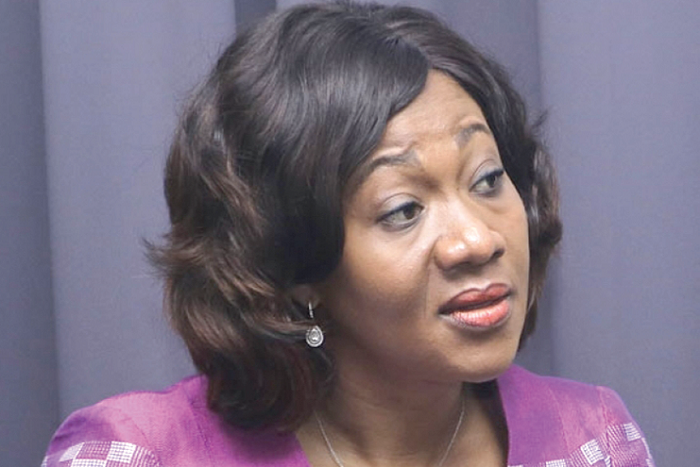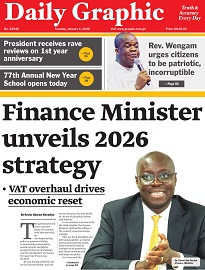
EC to ‘arrest’ fake news
The Electoral Commission (EC) has started building a media monitoring team to help identify the originators and facilitators of fake news in the lead up to next year's elections.
The aim is to prevent misinformation from obstructing the electoral process, the Chairman of the Commission, Mrs Jean Mensa, has said.
She said the team would be resourced to, among others, monitor the social media space, traditional media and other channels to identify misinformation and unauthentic information that would be put out by unscrupulous individuals or organisations about the electoral process to enable the EC to respond to them promptly.
"Fake news is real; the EC receives our share of it, and it is like a baptism of fire. The fake news is often targeted to malign the activities of the commission, but we have always tried to respond to it and that is why we want to solidify our communication team to be a step ahead of the originators of these fake news,” she said.
The EC boss stated this in a panel discussion at the ongoing West Africa Media Excellence Conference and Awards (WAMECA) in Accra on Friday.
WAMECA
The WAMECA, which opened last Thursday, is on the theme: "Social media, fake news and elections in Africa," and is meant to explore ways by which stakeholders could collaborate to deal with the negative impact of social media and fake news ahead of the 2020 elections.
The Chairperson of the EC of Burkina Faso, Mr Ahmed Newton Barry, was the other member of the panel that was moderated by the Chairperson of the Information Regulator of South Africa, Advocate Pansy Tlakula.
Top police officers from three West African countries, including Ghana, also had a similar panel on Fake News and Election Security at which they unanimously underscored the need for stakeholders to collaborate to deal with originators of fake news.
Necessary evil
Mrs Mensa said although the EC had leveraged social media platforms to disseminate information promptly to the public and carry out voter education, the use of those platforms to spread fake news was worrying.
She described social media as a double-edged sword and a necessary evil that the EC could not do without in the discharge of its mandate.
"Social media has helped us to reach out to our constituents with prompt information; we have relied on it for extensive voter education, and it has helped us to cut down cost of advertisement and sending information through the mainstream media.
"However, the spread of fake news using those channels has made it a complex platform and we are preparing to deal with it," she said.
The EC boss said dealing with fake news required not only the building of a robust monitoring team but the unified efforts of all stakeholders.
"This is especially so because as you work to ensure that the electoral process works well, some people are also behind the scene trying to bring in fake news to distort things," she said.
Education
For his part, Mr Barry said the call for stakeholder collaboration to deal with the negative effect of social media was non-negotiable.
He noted that 50 per cent of Burkina Faso's 10 million registered voters for next year's elections were under 25 years and that meant that they consumed a lot of social media content.
"What we are looking at is to educate people more on the use of social media because the absence of education is the major reason why it has been misused," he said.
Mr Barry added that electoral management bodies in Africa could not shy away from incorporating social media use into their operations, but stressed that there was the need for a dedicated budget for that purpose.
He also urged journalists to stay away from the tendency of always wanting to be the first to break the news, saying that such a tendency facilitated the spread of fake news.
Election security
The panelists on Fake News and Election Security were the Director-General in charge of Public Affairs Directorate of the Ghana Police Service, Assistant Commissioner of Police (ACP) Mr David Eklu; the Deputy Public Relations Officer of the Guinean National Police, Supt Gassimou Soumah; and the Regional Coordinator of Women, Peace and Security at the West Africa Network for Peacebuilding (WANEP), Ms Queeneth Tawo.
They observed that the security agencies played a critical role in maintaining peace before, during and after elections for which reason more needed to be done to prevent the spread of fake news.
ACP Eklu said the users of social media had become so complex and for that reason, the security agencies required support to improve on their tracking mechanisms.
"Fake information is a security threat; it can be a tool to mobilise people to destabilise the country, so the need for systems that will help the security agencies to respond promptly to such news that has security implications before people act on them is critical," he stressed.
Public support
Supt Soumah urged the public to support the police to track down originators of fake news and avoid the tendency of attacking the police in the line of duty.
He noted that ill-minded persons who peddled fake news would slip through the net and cause insecurity if members of the public did not support the security agencies to track them.
Ms Tawo said naming and shaming of perpetrators of fake news would be an appropriate tool to deal with the situation.
“I will also urge people not to consume social media content anyhow without authenticating it. People need to learn to be informed and verify the authenticity of information before sharing it on social media,” she said.

